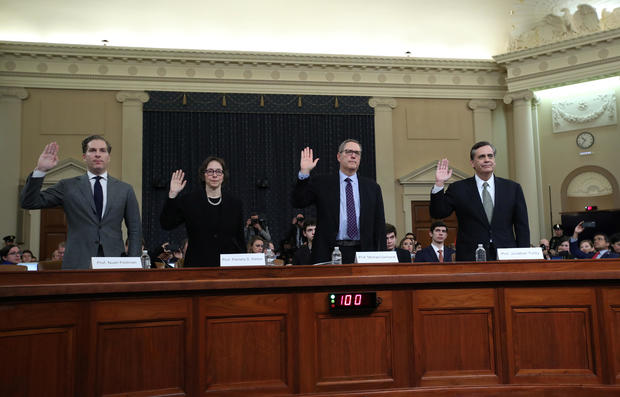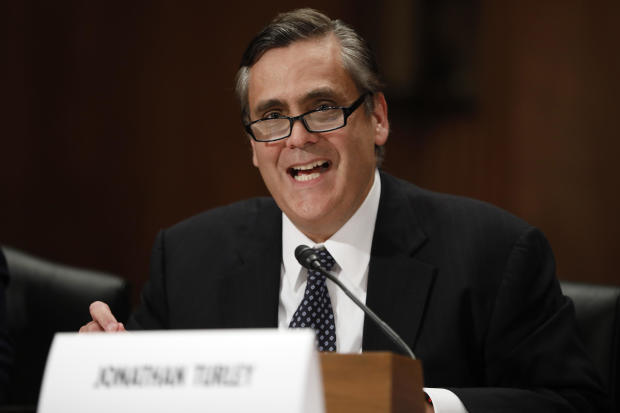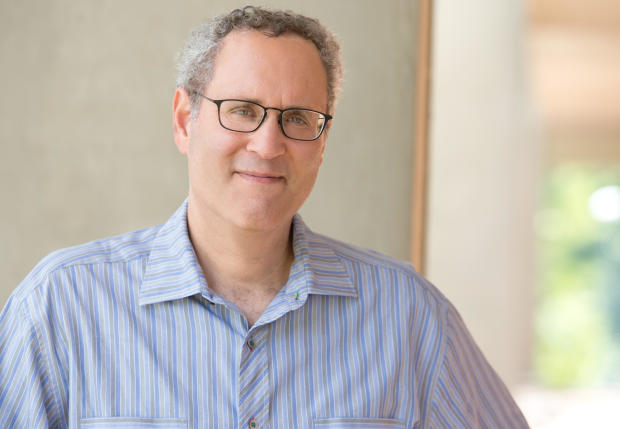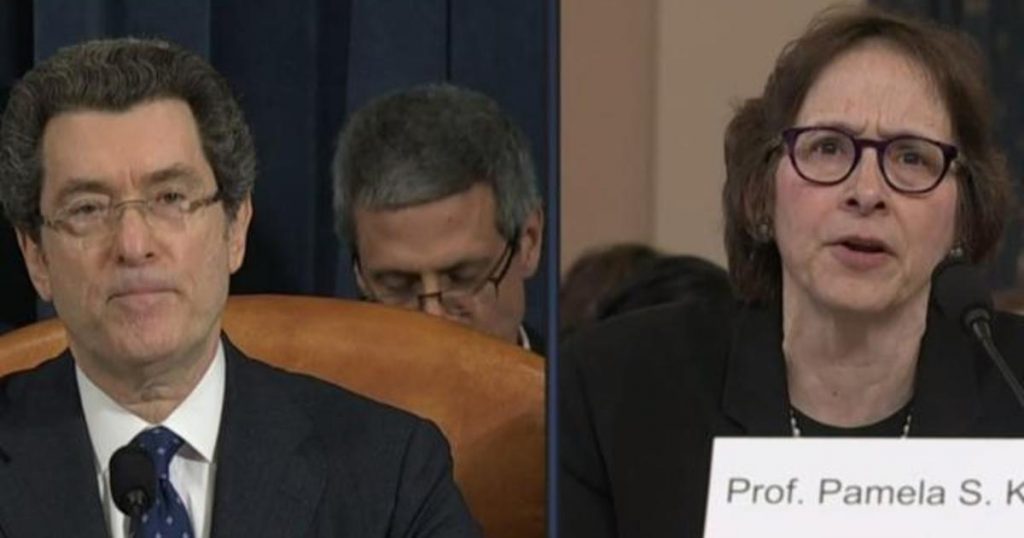Latest updates on the impeachment inquiry
- The House Judiciary Committee is holding its first hearing of the impeachment inquiry, featuring testimony from four constitutional law experts.
- Three of the four witnesses told lawmakers they believe President Trump committed impeachable offenses by pressuring Ukraine to open investigations that would benefit him politically.
- On Tuesday, the House Intelligence Committee voted to adopt a 300-page report by Democrats accusing the president of abusing his office and endangering national security.
- Download the free CBS News app to stream live coverage of the impeachment hearing.
Washington — The House Judiciary Committee is hearing testimony on the constitutional grounds for impeachment from four experts, three of whom believe the president committed impeachable offenses in his dealings with Ukraine.
The committee, which will be responsible for drafting potential articles of impeachment, is holding its first hearing in the impeachment inquiry, featuring testimony from constitutional law scholars Noah Feldman, Pamela Karlan, Michael Gerhardt and Jonathan Turley, a CBS News legal analyst.
Chairman Jerry Nadler opened the hearing by saying the president “directly and explicitly invited foreign interference in our elections.”
“Never before in the history of the republic have we been forced to consider the conduct of a president who appears to have solicited personal political favors from a foreign government,” Nadler said. “Never before has a president engaged in a course of conduct that included all of the acts that most concerned the framers.”
Feldman, Karlan and Gerhardt were called to testify by the Democratic members, and were in agreement in their belief that President Trump had committed impeachable offenses under the Constitution.
“If what we’re talking about is not impeachable, than nothing is impeachable,” Gerhardt said.
Turley was called by the Republicans and was the only witness who said he did not believe impeachment was warranted based on the House investigation.
“If you’re going to accuse a president of bribery, you need to make it stick, because you’re trying to remove a duly elected president of the United States,” Turley testified.
Nadler begins five-minute rounds of questioning
1:16 p.m.: Noting the president had declined to have his counsel question the witnesses, Nadler moved to five-minute rounds of questioning from committee members. Nadler asked three of the witnesses to push back against testimony from Turley, who was the only witness questioned by the Republican counsel.
Feldman said bribery had a “clear meaning” in the constitution, and Mr. Trump’s actions fit the definition. Karlan also said bribery did not necessarily involve financial remuneration, but any kind of a “reward.”
Gerhardt also pushed back against Turley’s argument that obstruction of justice was only related to the courts, and not Congress.
“It’s an obstruction of any lawful proceeding,” Gerhardt said.
Collins then responded to witnesses saying what they believe founders would think about Mr. Trump, saying it was “simply malpractice” and “simply pandering to the camera” to speculate about what the framers would think. — Grace Segers
Turley says Democrats are abusing power by pursuing obstruction
1:03 p.m.: Turley criticized House Democrats for accusing Mr. Trump of obstructing Congress by not handing over information the committees have requested and instead asking the courts to weigh in.
“If you impeach a president, if you make a high crime and misdemeanor out of going to the courts, it is an abuse of power. It’s your abuse of power,” Turley told lawmakers. “You’re doing precisely what you’re criticizing the president for doing.”
Turley noted that Mr. Trump is allowed to seek a ruling from the courts on whether the White House has to comply with congressional subpoenas for witness testimony and documents. The president has refused to cooperate with the House’s impeachment inquiry into him and has blocked key White House officials from appearing before committees.
“President Trump has gone to the courts. He’s allowed to do that,” he said. “We have three branches, not two.”
Turley noted that while Democrats criticize Mr. Trump for claiming he has unlimited power under Article II, they are behaving much in the same way.
“You’re doing the same thing with Article I. You’re saying Article I gives us complete authority that when we demand information from another branch, it must be turned over or we’ll impeach you in record time,” he said.
Compounding that, Turley added, is the relatively rapid pace of the House’s investigation.
“It’s a perfect storm. You set an incredibly short period, demand a huge amount of information, and when the president goes to court, you then impeach him,” he said. “Does that track with what you’ve heard about impeachment? Does that track with the rule of law that we’ve talked about?” — Melissa Quinn
Turley questions allegations of bribery and obstruction by Trump
12:40 p.m.: After the break, Collins had the chance to begin questioning Turley. But before giving the Republican-called witness a chance to speak, Collins decried the process so far, complaining Nadler has no obligation to provide exculpatory evidence. He also complained about the cold temperature of the room, and how uncomfortable his chair was.
Turley, given the floor, said he disagrees with his fellow witnesses that the president’s actions constitute bribery.
“If you’re going to accuse a president of bribery, you need to make it stick, because you’re trying to remove a duly elected president of the United States,” Turley testified.
.@JonathanTurley: “The statement has been made, not just by these witnesses but Chairman Schiff & others, is that this is a clear case of bribery. It is not. And Schiff said that it might not fit today’s definition of bribery, but it would fit the definition in the 18th century.” pic.twitter.com/aQ8lSgBXoP
— CBS Evening News (@CBSEveningNews) December 4, 2019
“The statement has been made, not just by these witnesses but Chairman Schiff and others, is that this is a clear case of bribery. It is not,” Turley said.
Turley pointed to the case of former Virginia Governor Bob McDonnell, whose corruption conviction was overturned by the Supreme Court eventually overturned that conviction and rejected the definition of bribery.
“It gives me no joy to disagree with my colleagues here, and I really don’t have a dog in this fight,” Turley said.
Turley also cautioned the members about the definition of “obstruction.”
“The record does not establish obstruction in this case,” Turley said, adding impeachment charges have to be based on “proof,” not “presumptions.”
Turley also questioned the seemingly swift pace of Democrats’ impeachment proceedings.
“Fast is not good for impeachment,” Turley said. — Kathryn Watson
Experts say it doesn’t matter if Ukraine aid was eventually released
12:11 p.m.: Three of the four witnesses swatted down the Republican argument that Mr. Trump did nothing wrong because aid was eventually released to Ukraine, and the Ukrainian president never announced investigations into the Bidens.
“If the president of the United States attempts to abuse his office, that is a complete impeachable offense,” Feldman said. He compared it to the Nixon campaign’s attempt to break into Democratic headquarters during Watergate — just because the break-in was unsuccessful doesn’t mean it wasn’t an impeachable offense.
“Soliciting itself is the impeachable offense,” Karlan agreed.
Gerhardt compared Mr. Trump’s conduct to robbing a bank and dropping the money when police enter the bank, saying an attempted crime was still important to prosecute.
“This is precisely the misconduct that the framers created the Constitution, including impeachment, to protect against,” Gerhardt said. — Grace Segers
Questioning expands into Trumps’ potential obstruction of justice in Russia investigation
12:08 p.m.: As foreshadowed by Nadler’s opening statement, Eisen waded into the Russia investigation, a move that could be used to paint a broader picture of the president’s conduct.
Eisen circled back to Gerhardt’s testimony, in which he mentioned former special counsel Robert Mueller’s description of multiple instances of possible obstruction of justice during his investigation. Those instances included the president ordering then-White House counsel Don McGahn to fire Mueller and the president ordering McGahn to create false records about the order, as Mueller’s report outlined and Eisen reiterated.
“Both individually and collectively, these are evidence of obstruction of justice,” Gerhardt testified.
“It is quite serious, and that’s not all of it, of course,” Gerhardt continued. “And we know, as you’ve mentioned before and as others have mentioned, obstruction of justice has been recognized as an impeachable offense, both against President Clinton and President Nixon. This evidence that’s been put forward by Mr. Mueller that’s in the public record is very strong evidence of obstruction of justice.” — Kathryn Watson
Witnesses warn of dangers from failing to impeach
12:00 p.m.: Karlan warned that if the committee concludes the findings put forth by the House Intelligence Committee are indeed accurate, failing to investigate and impeach the president would effectively give future U.S. leaders the green light to engage in similar behavior.
“Because this is an abuse of power that cuts to the heart of democracy, you need to ask yourselves, if you don’t impeach a president who has done what this president has done — or at least you don’t investigate and then impeach, if you conclude that the House Select Committee on Intelligence’s findings are correct — then what you’re saying is, it’s fine to go ahead and do this again,” she said.
Karlan also warned of the dangers posed to the election system by foreign interference.
“It’s your responsibility to make sure that all Americans get to vote in a free and fair election next November,” she said.
Norm Eisen, the Democratic counsel, asked Karlan what responsibility the House Judiciary Committee has with respect to alleged abuses of power by Mr. Trump.
“It’s not a real democracy, it’s not a mature democracy, if the party in power uses its power to go after its enemies,” Karlan said.
Gerhardt echoed Karlan’s sentiment, but warned that if Mr. Trump’s conduct “is not impeachable, then nothing is impeachable.”
“If Congress concludes they’re going to give a pass to the president here, as Professor Karlan suggested earlier, every other president will say, ‘OK, then I can do the same thing,’ and the boundaries will just evaporate,” he said. “And those boundaries are set up by the Constitution, and we may be witnessing unfortunately their erosion, and that is a danger to all of us.” — Melissa Quinn
Karlan says that Trump’s actions constitute bribery
11:50 a.m.: Karlan said that Trump’s actions constituted bribery, although not in the way that modern law defines the term. She said the framers of the Constitution had a specific meaning in mind when they bribery as one of the explicit offenses warranting impeachment.
“What they were thinking about was bribery as it was understood in the 18th century,” Karlan said, adding that the founders would have understood bribery to mean “the idea that when you took private benefits, or when you asked for private benefits in return for an official act … that was bribery.”
Democrats have recently argued Mr. Trump not only engaged in a quid pro quo, but committed bribery by asking the Ukrainian president to investigate the Bidens. — Grace Segers
Impeachment doesn’t require a statutory crime, witnesses say
11:35 a.m.: All four witnesses agreed that impeachment doesn’t necessarily require the violation of a law as laid down by statute.
Here is the exchange Eisen had with two of the witnesses:
“Professor Gerhardt, does a high crime and misdemeanor require an actual, statutory crime?” Eisen asked.
“No. It plainly does not,” Gerhardt responded. “Everything we know about the history of impeachment reinforces the conclusion that impeachable offenses do not have to be crimes, and again not all crimes are impeachable offenses. We look at again at the context and gravity of the misconduct.”
Eisen then turned to Turley, who isn’t in favor of impeachment: “And Professor Turley, you recently wrote in the Wall Street Journal, and I quote, ‘There is much that is worthy of investigation in the Ukraine scandal, and it is true that impeachment doesn’t require a crime.'”
“That’s true, but I also added an important caveat,” Turley attempted to interject.
“Sir, it was a yes or a no question,” Eisen continued. “Did you write in the Wall Street Journal, “There is much that is worthy of investigation in the Ukraine scandal, and it is true that impeachment doesn’t require a crime?’ Is that an accurate quote, sir?”
“You’ve read it well,” responded a smiling Turley. — Kathryn Watson
Nadler and Democratic counsel begin questioning witnesses
11:30 a.m.: Nadler kicked off the first round of questioning with 45 minutes granted to himself and Norm Eisen, who is serving as the Democratic counsel. Nadler asked Karlan whether the president’s conduct “endangers” the right to vote. Karlan answered “yes.”
Gerhardt said that when the president declines to cooperate with House investigations, it “torpedoes separation of powers.”
Eisen, who served as White House special counsel for ethics and government reform during the Obama administration, began his questions by asking whether the president’s behavior constituted “high crimes and misdemeanors.”
“We three are unanimous,” Gerhardt said about his consensus with Feldman and Karlan that the president’s actions were impeachable. — Grace Segers
Karlan hits back at Collins for suggesting witnesses couldn’t be prepared for hearing
11:01 a.m.: Stanford Law School professor Pamela Karlan hit back at Collins for suggesting she and her fellow witnesses did not have the time to absorb the evidence and testimony presented throughout the impeachment inquiry.
“I am insulted by the suggestion as a law professor that I do not care about those facts,” Karlan told Collins directly, noting she read all the transcripts from each witness who testified publicly before the House Intelligence Committee.
“I would not speak about these things without reviewing the facts,” she added.
During his opening statement, Collins criticized the impeachment inquiry and questioned the relevance of the hearing, saying Americans “will see why people don’t go to law school.”
“Unless you’re really good on TV or watching the hearings over the last couple of weeks, you couldn’t have possibly, actually digested the Adam Schiff report from yesterday or the Republican response in any real way,” Collins said of the legal scholars appearing before the committee. — Melissa Quinn
3 of 4 witnesses say Trump committed impeachable offenses
10:40 a.m.: Three of the witnesses appearing before the committee said in their written opening statements that the evidence and constitutional precedent dictate Mr. Trump should be impeached, while the fourth argued impeachment would be divisive and unnecessary. Each is being given 10 minutes to summarize their testimony.
Feldman says in his opening statement that Mr. Trump “committed impeachable high crimes and misdemeanors by corruptly abusing the office of the presidency” in asking the Ukrainian president to investigate a political rival. He says the July 25 call alone was enough justification to impeach the president, although he adds that withholding aid to Ukraine and dangling a White House visit to the Ukrainians were also impeachable offenses.
Gerhardt argued that Mr. Trump’s behavior was comparable to that of Richard Nixon, who resigned ahead of an impeachment vote in the House.
“The president’s serious misconduct, including bribery, soliciting a personal favor from a foreign leader in exchange for his exercise of power, and obstructing justice and Congress are worse than the misconduct of any prior president, including what previous presidents who faced impeachment have done or been accused of doing,” Gerhardt wrote. He noted that unlike Nixon, Mr. Trump was refusing to provide documents to the House committees conducting the inquiry.
The third witness called by Democrats, Karlan, argued Mr. Trump’s actions had aided Russia, the country which interfered in the 2016 election. Karlan said Mr. Trump’s behavior “shows a president who delayed meeting a foreign leader and providing assistance that Congress and his own advisors agreed served our national interest in promoting democracy and limiting Russian aggression.”
“Put simply, a candidate for president should resist foreign interference in our elections, not demand it. If we are to keep faith with the Constitution and our Republic, President Trump must be held to account,” Karlan said.
However, Turley, the witness called by Republicans, disagreed that Mr. Trump’s actions constituted impeachable offenses. He said the evidence collected by the Intelligence Committee was based on testimony from witnesses who had second-hand knowledge of the situation.
“I do not believe that this impeachment will be viewed as bringing credit upon this body. It is possible that a case for impeachment could be made, but it cannot be made on this record,” Turley said. — Grace Segers
Collins condemns impeachment process: “This is sad”
10:31 a.m.: Ranking Member Doug Collins, an ally of the president, slammed the impeachment inquiry in his opening statement. Collins accused Democrats of pursuing impeachment because of their animus towards the president.
“You just don’t like the guy. You didn’t like him since he was elected November 2016,” Collins said. “So don’t tell me this is about new evidence and new things and new stuff … but this is nothing new, folks. This is sad.”
Collins did not mention Mr. Trump’s call with the Ukrainian president or other aspects of the investigation, instead choosing to focus on the process. He said this hearing was essentially useless because it featured academic experts, not fact witnesses.
“The American people are really going to look at this and say, ‘Huh? What are we doing?'” Collins said. He said “the president has nothing to ask” the academic experts.
Collins also made a motion to require the testimony of Intelligence Committee Chairman Adam Schiff before the committee, which was tabled by a vote. — Grace Segers
Nadler opens hearing: “I do not wish this moment on the country”
10:20 a.m.: Nadler opened the hearing by summarizing the House Intelligence Committee’s report on the president’s intervention in Ukraine, as well as Russia’s interference in 2016 and how, Nadler said, Mr. Trump welcomed that assistance. Nadler’s opening remarks set up the possibility that the House could consider the president’s conduct beyond just Ukraine.
“President Trump welcomed foreign interference in the 2016 election,” Nadler said. “He demanded it for the 2020 election. In both cases, he got caught. And in both cases, he did everything in his power to prevent the American people from learning the truth about his conduct.”
“Never before in the history of the republic have we been forced to consider the conduct of a president who appears to have solicited personal political favors from a foreign government,” he said. “Never before has a president engaged in a course of conduct that included all of the acts that most concerned the framers.”
Nadler also emphasized the president’s resistance towards complying with Congress and congressional subpoenas. Democrats haven’t ruled out an obstruction of justice article of impeachment.
“I do not wish this moment on the country. It is not a pleasant task that we undertake today,” Nadler said.
But weighing the president’s conduct, Nadler said, is their duty under the Constitution. If the Congress does not hold the president in check now, he might repeat his behavior, Nadler said. — Kathryn Watson
How the hearing will play out
9:53 a.m.: The hearing will follow the same procedure as the hearings before the House Intelligence Committee. Chairman Jerry Nadler and Ranking Member Doug Collins will both deliver opening statements, speaking for about 10 minutes each. Then the witnesses will be sworn in and given the opportunity to deliver their own statements.
The hearing then moves to two 45-minute rounds of questioning controlled by Nadler and Collins, who can delegate questioning to staff. Nadler will rely on Norm Eisen, a prominent Democratic attorney and former Obama administration official, for some questions.
Members will then be given five minutes each to question the witnesses, alternating between parties. There are 41 members on the committee, nearly twice as many members as the Intelligence Committee. — Rebecca Kaplan
Read the witnesses’ opening statements
9:15 a.m.: The Judiciary Committee released the prepared testimony from the four witnesses:
Who is Jonathan Turley?
8:15 a.m.: Turley is the J.B. and Maurice C. Shapiro Professor of Public Interest Law at The George Washington University Law School, which he joined as a faculty member in 1990. He is also a CBS News legal analyst and one of the country’s most recognized legal commentators.
A witness during the Clinton impeachment proceedings, Turley has been critical of the Democrats’ handling of the current inquiry, as well as the White House’s arguments against cooperating with the probe. Turley has written and testified extensively on executive privilege.
He has testified before Congress on a number of other occasions, including the Senate confirmation hearings of Attorneys General Loretta Lynch and William Barr, as well as the Supreme Court nomination of Associate Justice Neil Gorsuch.
Who is Michael Gerhardt?
8:00 a.m.: Gerhardt is the Burton Craige Distinguished Professor of Jurisprudence at the University of North Carolina School of Law, where he has been a faculty member since 2005.
Who is Pamela Karlan?
7:18 a.m.: Karlan is the Kenneth and Harle Montgomery Professor of Public Interest Law and co-director of the Supreme Court Litigation Clinic at Stanford Law School, where she has been on faculty since 1998. According to her Stanford biography, she holds three degrees from Yale University and clerked for Supreme Court Justice Harry Blackmun. Karlan was also a deputy assistant attorney general in the Civil Rights Division at the Justice Department.
Karlan has written “leading casebooks on constitutional law, constitutional litigation, and the law of democracy, as well as numerous scholarly articles,” according to Stanford.
Who is Noah Feldman?
6:30 a.m.: Feldman is the Felix Frankfurter Professor of Law and director of the Julis-Rabinowitz Program on Jewish and Israeli Law at Harvard Law School. A Rhodes scholar, Feldman graduated summa cum laude from Harvard University and earned his law degree at Yale, according to his Harvard biography.
Feldman clerked for Supreme Court Justice David Souter in the late 1990s and served as a senior constitutional adviser to the Coalition Provisional Authority in Iraq after the U.S. invasion in 2003, where he then helped Iraqi officials draft an interim constitution.
How to watch Wednesday’s impeachment hearing
- Date: Wednesday, December 4, 2019
- Time: 10 a.m. ET
- Who: Four constitutional law experts: Noah Feldman, Pamela Karlan, Michael Gerhardt and Jonathan Turley
- Online stream: CBSN, in the player above and on your mobile or streaming device
- On TV: Your local CBS station
Key findings from the Democratic impeachment report
5:00 a.m.: The report released Tuesday laid out nine findings of the investigation, including:
- The president “solicited the interference of a foreign government, Ukraine, in the 2020 U.S. presidential election” and “sought to undermine the integrity of the U.S. presidential election process.”
- Mr. Trump “sought to pressure and induce Ukraine’s newly-elected president, Volodymyr Zelensky, to publicly announce unfounded investigations” to benefit the president politically.
- “President Trump ordered the suspension of $391 million in vital military assistance” to Ukraine “without any legitimate foreign policy, national security, or anti-corruption justification.
- “Faced with the revelation of his actions, President Trump publicly and repeatedly persisted in urging foreign governments, including Ukraine and China, to investigate his political opponent.”
- “President Trump ordered and implemented a campaign to conceal his conduct from the public and frustrate and obstruct the House of Representatives’ impeachment inquiry.”
— Stefan Becket
Democrats to focus on “ABCs of high crimes and misdemeanors” at hearing
4:30 a.m.: Democratic staffers working on the impeachment inquiry held a conference call to preview the party’s strategy heading into Wednesday’s hearing before the Judiciary Committee. Four legal experts will appear for questioning before lawmakers to “explain the scope of that constitutional standard of impeachment.”
“The hearing tomorrow will explore the extent to which this powerful, powerful evidence we now have of the president’s conduct implicates all of these dangers,” one of the staffers said. “You can think of them as the ABCs of high crimes and misdemeanors: abuses of power, betrayal of national security connected to foreign interest and corruption of our elections.”
Asked whether the questions will be limited to the material in the House Intelligence Committee’s report, one staffer said, “We will certainly have a primary focus on the Intelligence Committee report but we will see what other information comes up tomorrow,” suggesting Democrats may raise questions related to actions by the president described in the Mueller report. — Rebecca Kaplan






